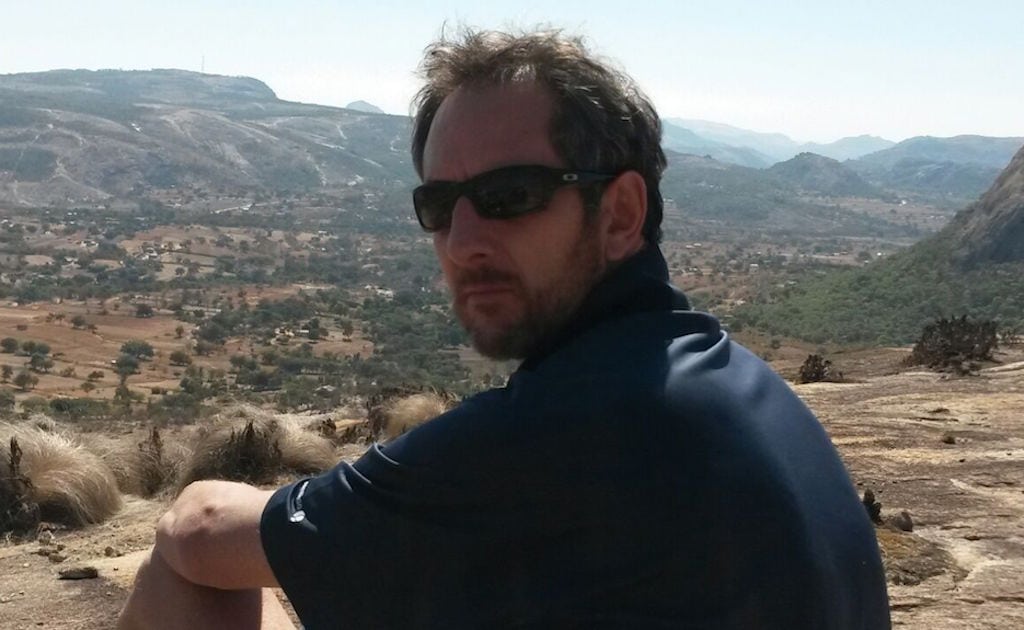Skift Take
How does a travel startup succeed in Zimbabwe and throughout Sub-Saharan Africa? Focus on a neglected space in a huge market. Whether startup Africabookings can make it as a business remains to be seen. The market opportunity, though, is certainly humongous.
In our Skift Startup Stories series, we document travel startup issues, solutions, and lessons from a variety of angles, hoping to shed light on what separates the winners from the losers.
You can read all of the stories in the series here.
Bruce Tapping, the CEO of Africabookings, believes he’s in the right place at an opportune moment.
Born in Zimbabwe and after starting a tourism magazine in Cape Town, South Africa in 1993, Tapping began a self-imposed exile in London in 2000, working in publishing, and then relocated to China where he took up a position in finance.
“I met up with a couple of other tourism professionals in China and together we decided that the online space in Africa is what was interesting,” Tapping says. “It was time to move into it. We see a lot of statistics which indicate that Africa is going to take off pretty rapidly. So we decided to come back here and really get in and start signing up hotels and distributing them online.”
Tapping returned to Harare, Zimbabwe and got Africabookings off the ground in 2014. Using their own shareholder capital and having attracted a modest $25,000 in open-the-office door money from Travel Startups Incubator, the three-employee Africabookings has set its sights on bringing some hotels online for the first time in sub-Saharan Africa, including countries such as Zimbabwe, Botswana, Zambia, Malawi, Tanzania, Mozambique, Uganda, Rwanda, and Burundi.
In addition to the three full-time staff members, five to 10 people work for Africabookings in sales on a contractor basis, pushing the company’s B2B connectivity technology to property owners and managers. Working through direct relationships with hotels and one wholesaler, Africabookings counts some 2,000 properties among its partners, according to Tapping, and the company distributes their rooms through Africabookings.com and Africabookingscrs.com.
Tapping says Africabookings is also working with travel agents and hopes to develop mobile distribution capabilities.
For now, at least, the traffic to Africabookings.com is small. This consumer site is fairly new and the company, which is focusing on the B2B side of things anyway, just started enrolling travel agents this month.
Like any startup worth its sadza, Africabookings is seeking to solve a business problem in a neglected space. Ultimately, the market will likely decide whether Africabookings is different enough from others doing comparable things, and whether it has the staying power to keep at it.
Big players, such as Booking.com and Expedia, among others, are also exploring the continent, but they are focused mostly on distribution, Tapping says.
“There are a couple of companies based in Nigeria, Hotels.ng and Jovago, which are playing the consumer game,” Tapping says. “What we are doing is concentrating on areas that really no one else is concentrating on. We look to be the B2B distributor.”
Like any startup under development, Africabookings, which is a UK-registered company with its operations in Zimbabwe, has to find its footing as a relative unknown newbie among established players. It also has to overcome what Tapping views as misconceptions about the vast continent.
Skift spoke with Tapping about these issues and an edited version of the interview follows:
Skift: How did your experience outside of Africa shape some of your moves in starting Africabookings.com?
Bruce Tapping: It’s been absolutely fantastic to be back. I absolutely love it. I think that Africa has an extraordinarily bad [reputation] worldwide and people just have got a wrong impression of it. I will take my two daughters — one’s three and one’s five — and we’ll drive across Africa without any issues whatsoever. It’s very safe and it’s got friendly, warm people. So we really just love being here and we think it’s an incredible industry with massive potential. I really think that the world’s going to start looking at it in the next couple of years in the same way that you saw 30 years ago places like Phuket in Thailand being backwaters and they just suddenly boomed over a few-year period. I really feel that Africa’s got that potential.
One of the big areas that we look at is European tourism. It’s a fantastic time for European travelers to come here. You’ve got your winter holidays, it’s an awesome destination. Beautiful beaches.
Skift: Is it mostly about travel from Europe or is domestic travel a big part of the mix too?
Tapping: There’s rising demand in domestic travel. Both from a leisure and a business perspective. I think that demand is coming form two areas. First, you have a great amount of regional business travel. So obviously now as you see Africa’s star rising and you see 11 of the 16 fastest-growing economies in the world are in sub-Saharan Africa, you’re seeing a lot more trade between African countries, and therefore, a lot more movement of people. So that’s number one. Secondly, you’ve got very good and growing network of air operators now. So not only do you have established operators like South African Airways and Kenya Airways, but you’ve got very good operations run by Ethiopian Airlines, and then you’ve got these low cost carriers that are coming in, including Fastjet and Fly Africa.
In four or five years, I think you’re going see to an Africa that’s very different to what people think of Africa. A lot of people still think of Africa as the way Africa was in the 1970s and 1980s. It’s not like that anymore.
Skift: So do you think online adoption, in particular, is gonna really pick up its pace in Africa?
Tapping: Yes, if you look at mobile penetration in Africa, there are a lot of of countries where it’s already over 100 percent. I mean people who’ve got more than one mobile phone per person across the whole country. That same statistic’s is going to go through into online and also mobile’s going to be a big part of that. And what you’re looking at is that in Africa, you also have a scenario where people leapfrog into technologies in a different way than it’s occurred in the rest of the world. One of the good examples here would be telephone landlines, which people just don’t bother having anymore because they don’t operate very well. Whereas mobile technology does operate. The simple reason for that is mobile technology is private and there is good investment.
Skift: Is there a great reluctance among hotels to get online?
Tapping: Not at all. There is some ignorance. People are very interested in learning and want to understand. You often go into a hotel and ask them “do you know Booking.com or Expedia?” and the answer will be “no.” You go to a hotel and say this is what we’re doing. You go through the online revolution that occurred in the 1990s and 2000s in Europe, America, Asia etc. It just hasn’t hit here in large part.
Skift: So you mentioned that Booking.com and Expedia are making inroads in parts of Africa. Booking.com, in particular, is trying to work more closely on the B2B side with hotels. Are you seeing that in Africa?
Tapping: They obviously have BookingSuite and I think that’s an excellent product. I’m seeing some hotels using that. I think it will work. I think that their technology and what we’re doing is the way forward and I do think that… we’ll compete with them. It’s a very, very large market and we aim to offer a comprehensive listing of all he hotels that we will then distribute via our growing B2B channels.
Skift: What about the startup scene? Is there a vibrant startup scene in Zimbabwe?
Tapping: Not necessarily exactly where I am, but definitely in South Africa and Nigeria there is. And Kenya. I would say that across the board, those three countries, I mean across industries, you’re seeing a pretty vibrant start scene. You’re seeing a lot of interesting startups in Kenya, Nigeria, and South Africa.
Skift: What about in travel, specifically?
Tapping: Not necessarily African-based. Not people like myself. In Nigeria, yes, there are a couple people there because Nigeria’s such a large market with a population of 60 million people so you’ve got a couple of people doing that. But I think we’ve got a bit of a headstart here and we hope to retain that.
The Daily Newsletter
Our daily coverage of the global travel industry. Written by editors and analysts from across Skift’s brands.
Have a confidential tip for Skift? Get in touch
Tags: africa, distribution, gds, hotels, sss
Photo credit: Africabookings CEO Bruce Tapping in Domboshawa, outside Harare, Zimbabwe. Africabookings

